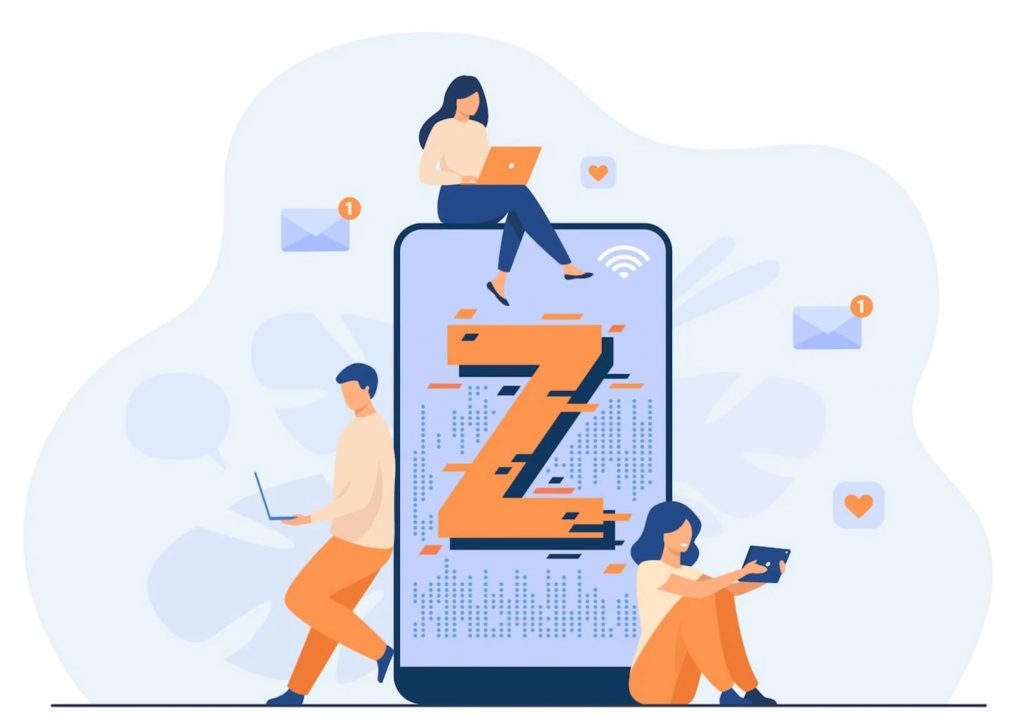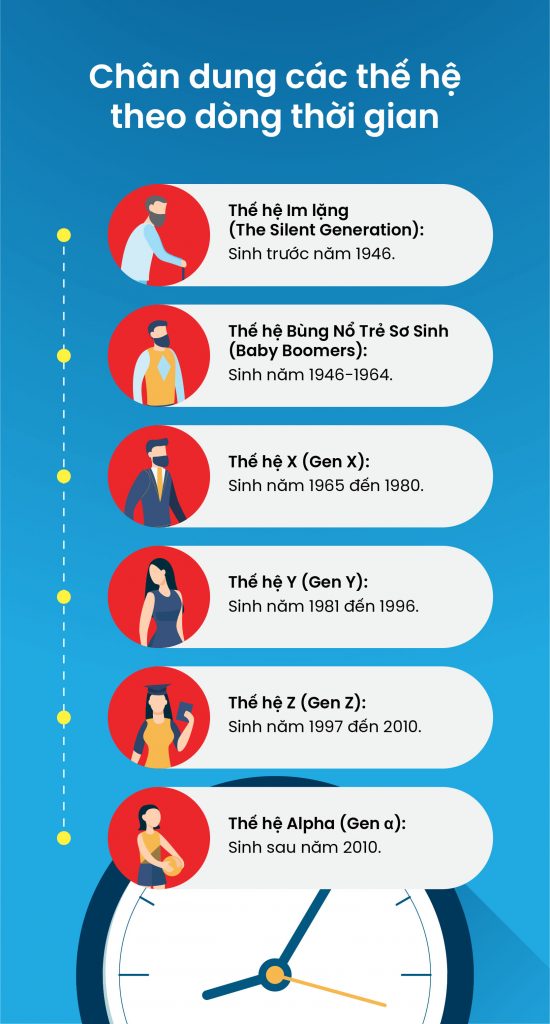
As the previous generations gradually mature and establish their place in society, it is also time for us to welcome the development of the next generation, Gen Z.
Generation Z is a community of young people who are always vibrant, dynamic and enthusiastic. However, perhaps we have sometimes encountered complaints from our predecessors about the strange personality of this generation.
What is Gen Z?
Gen Z (Generation Z), aka Generation Z, is a term used to refer to the group of people born between 1997 and 2012.
Because they were born in the era of technology and the Internet boom, Gen Z also has other names: iGeneration, Homeland Generation, Net Gen, Digital Natives, Neo-Digital Natives, Pluralist Generation, Internet Generation, Centennials, Post-Millennials, Zoomer, Gen Wii, Gen-Tech.
Most members of Gen Z are children of Gen X (Source: Wikipedia).

What generation came before Generation Z?
Portraits of generations over time

To visualize more clearly, first of all, let's briefly review the generations along the timeline:
- The Silent Generation: Born before 1946. They are a group of people born and raised in the most difficult conditions when the economy and politics were still unstable. Life circumstances have brought about their cautious, conscientious behavior and pursuit of a stable life. This is also the generation of grandparents of many early Gen Z young people today.
- Baby Boomers: Born in 1946-1964. There are 2 common types of people in this generation. 1 is retired, resting and settling down. 2 is to often have a stable career with senior positions (CEO,...). Holding good "chairs" also means high ambition, loyalty, discipline, and focus on their work.
- Generation X (Gen X): Born in 1965-1980 and they are also considered old at the present time, influenced by the older generation's lifestyle. They are considered an educated group, aiming for stable work, working independently, being autonomous, resourceful and flexible.
- Generation Y (Gen Y): The "older" generation of Gen Z (Read more information below).
- Generation Z (Gen Z)
- Generation Alpha (Gen α): The "youngest brother" generation at the present time (Read more information below).
Gen Y – The "older" generation of Gen Z
The generation next to Z is Gen Y (Millennials), including the group of people born from 1981 to 1996.
Gen Y grew up during a time of technological innovation and the rapid development of giants such as Google, Facebook, LinkedIn, EBay, PayPal, etc. They are a generation with knowledge and understanding of high technology - at the same time. is also the key and fastest growing workforce at the present time.
At work, Gen Y often wants everything to be quick, neat, and direct while still ensuring satisfactory benefits. However, they are also impatient and easily wavered.

According to study by Professor Lavina Sharma (SIBM), Gen Y always works towards results. They continuously learn and improve themselves even after failures and mistakes. People of this generation also favor freedom and flexibility in work. They often feel more comfortable in a work environment where they can collaborate with others.
The generation gap between Gen Y and Gen Z is not too large, making them easy to get along with when working together in the office.
What generation comes after generation Z? – Alpha Gene
You may have realized that Gen Z is the generation "sandwiched" between Gen Y and Gen Alpha.
Located right behind Gen Z, Generation Alpha was born after 2010 to around 2025 – and will be the first generation completely born in the 21st century, most of whom will be the children of Gen Y.
For this generation, technology has now become an indispensable part of their lives. The learning, playing and entertainment of the Alpha generation is no longer associated with traditional and folk methods or games but is accompanied by the Internet, social networks, information technology and artificial intelligence (AI). ).

Also because of the frequency of using such outstanding technological devices, Gen Alpha is also considered the generation of "screenagers" - roughly understood as the generation of "screen devices". They are the future seedlings, promising to bring the "wind" of developing new modern technology for the future.
Characteristics of generation Z
Young people belong Generation Z grew up in the explosion of digital technology such as the Internet, social networks, or mobile devices. Therefore, this has created strong perceptions among Gen Z about the power of information, mass media, virtual experiences and globalization.
Perhaps because of this, Generation Z has a very outstanding personality trait, which is "Always seek and respect the truth”.
In addition, they also value big egos and personal freedom, loving autonomy in both life and finances. It is these personality traits that make Gen Z expected to be an explosive and disruptive factor in any business environment.
But…
There are increasingly mixed opinions about whether the unique personality traits of Gen Z will be a breath of fresh air or will becomeThorn” at work!
Compare Gen Z and Millennials (Gen Y)
Gen Z vs Gen Y – Different but not completely different
Despite the generational difference, the gap between these two groups is not too far - especially for young people at the end of Gen Y and the beginning of Gen Z. Some things in common between them include: such as: independence, desire to contribute to the community, taking knowledge as a "guideline",...
Besides, both Gen Z and Gen Y grew up and received a strong influence from scientific and technical development, along with progressive and advanced technological inventions. The learning mindset of this generation group therefore also becomes open, thereby accepting more opportunities.

Outstanding difference
What makes Gen Z different and somewhat more "outstanding" than other generations, their seniors, is their bold way of thinking "dare to think, dare to do".
According to study of Western Governors University, if placed on a comparison scale, Gen Z is often known for its differences from previous generations in the following points:
- They are more dreamy than realistic
- They have a more entrepreneurial mindset
- More talkative
- More competitive
- Pursue safety and protection
- Always have clear financial and career goals
In addition, Dr. Jean Twenge - author of the research book iGen: Why Today's Super-Connected Kids Are Growing Up Less Rebellious, More Tolerant, Less Happy… (Temporarily translated: iGen: Why are children growing up today less rebellious, more sympathetic, but less happy...) pointed out some different characteristics of the Gen Z generation compared to previous generations as follows:
- Easily understand and sympathize with social issues, such as cultural differences, sexual orientation, racism, etc.
- They care more about mental health, psychological issues, emotions, etc.
But at the same time, they are also often attached to some negative "labels" such as: anxious/depressed generation, easily affected by psychological problems, overprotected,...
The "pros and cons" of Generation Z in the eyes of other generations
The true director of life or “My life – my way”?
A study conducted by Alphabe, Asia's pioneering consultancy in human resources and employer branding solutions, pointed out that:
"Unlike previous generations, there are 81% young Gen Z people who confidently understand themselves, know what they like and don't like to do."
In the article titled “Headache with Gen Z: My child studies well, but thinks and acts strangely” published in Tuoi Tre newspaper, also points out the difficulties of parents in shaping their children's future.
It can be said that Generation Z is no longer limited to family frameworks and orientations like previous generations.

This open thinking style is also applied by Gen Z when going to work. Instead of choosing to stick with a business, Generation Z prefers starting a business, working freely, or focusing on society by joining non-governmental organizations.
However, this free and autonomous thinking sometimes also creates excessive comfort.
Many businesses complain when their Generation Z employees quit suddenly and without notice according to regulations. Although not all, cases like this have made Gen Z's image worse.
Ambition or Greed?
Gen Z grew up in a time of global economic pressure. That's why their pressures and life standards become more different than previous generations.
Many young people belong Generation Z acutely aware that need save for the future. They are constantly looking for better job opportunities for themselves to ensure financial security and independence.

For that reason, it is not strange that many employers feel that Gen Z sometimes requires higher salaries and benefits than their abilities and experience. That may also be the reason for the arbitrary "quitting" of many young Gen Z people when receiving offers with more attractive salaries from other places.
Confident or Arrogant?
Generation Z Enter the labor market with great motivation and desire to express yourself.
This unintentionally causes integration at work to take more time and lead to many problems negative view of Gen Z.
For example: never admitting mistakes, being willing to "duel" with the boss, even not caring about experience but being overconfident about one's own abilities.

Analyzes of attitudes and psychology show a very contrasting image when Generation Z:
- Likes to learn but is afraid of criticism and suggestions
- Work responsibly but not good under pressure
- Adapts quickly but is less comfortable if there are too many changes.
Perhaps we need to continue to wait for a stronger and more obvious transformation from this generation, from professional experience, to cultural integration and working style.
“Gen Z has many strengths, but too strong will become a weakness. Gen Z has personality but too much personality, personality to the point of being indulgent, disrespectful of others, regardless of everything is not okay. Individuality but must respect the universal values of society, personality must have limits"
Master Nguyen Thuy Uyen Phuong, according to Tuoi Tre newspaper.
Pragmatic or financially minded?
Today's Gen Z youth tend to pursue success and material values, some of them even consider it a standard measure of a happy, fulfilling life. The two factors that Gen Z values most when looking for a job are the working environment and compensation.
“The important thing is whether you make money or not” – is one of the somewhat familiar sayings from young Gen Z workers today.
They can also accept investing a period of time in learning to achieve the financial goals they set. However, wise Gen Z always ensures that their efforts are rewarded, specifically the appropriate salary they receive.
Maybe focusing too much on “money” and a materialistic lifestyle makes older generations somewhat uncomfortable. However, this cannot be considered pragmatic. After all, what Gen Z strives for is to fit into a real-life environment that is becoming increasingly competitive and harsh.
Witnessing financial pressure from family has become a great motivation for Gen Z to become increasingly interested in issues of financial stability, finding a job, saving and investing. Therefore, it can be said that financial thinking is also one of the outstanding personality traits of the Gen Z generation.
Fastidious or wise consumer?
Gen Z's consumer behavior can also reflect their values - as well as influence online purchasing trends.
Thanks to their technological skills and large social network networks, they often research and evaluate products carefully before deciding to purchase. Furthermore, Gen Z often believes in real user reviews rather than advertising from brands and celebrities.
This makes Gen Z look like demanding consumers. But actually it's not, they are quite "easy" in their shopping needs and life experiences - it just needs to be suitable and bring them personality and self-worth.
For example, Gen Z often tends to be willing to spend money on "green" and durable products even though the price is much more expensive.
Gen Z generation and lifestyle
Gen Z has always been highly competitive
Young people of generation Z are always competitive in most areas of life, from choosing a good university, having outstanding scores, to finding a job with a high income.
GenZ likes to work independently
Gen Z's competitive nature contributes to their desire to control their own work and not rely on it. That's why other genes often feel that Gen Z is arrogant in communication and afraid to listen to criticism.
However, this can still be viewed from another perspective. Generation Z is always proactive in exploring and accessing many sources of information, so they have strong opinions and want them to be heard.
They especially want to make equal contributions at work, and are given the right to self-manage and lead projects to be more stable in their careers.
However, this does not mean that Gen Z cannot cooperate with other colleagues.
Generation Z is extremely responsive to technology
Gen Z was born during the period of flourishing development of the Internet and technology products. Therefore, they are considered "natives" in the digital world. Among gen x gen y gen z, people of generation Z are the most adaptable and sensitive to technology. Even when comparing gen z gen y or gen y gen z gen z, people in the age group from 1997 - 2012 are considered to grasp and apply superior technology.
Colleagues probably won't be too surprised that a Gen Z person can easily master the use of machines in the office; or quickly operate complex internal software with just a few instructions.

In addition, they can also use this advantage extremely effectively when looking for information, new business ideas or work improvement initiatives.
Generation Z confident that they can take full advantage of the benefits of technology to serve their work proficiently.
Generation Z is open to ethnic diversity
As is known, Gen Z is not affected too much by the differences in race, sexual orientation or religion of those around them. Young people of this generation often evaluate and perceive a person depending on the person and personality, not on that person's background.
This is relatively easy to understand when Gen Z was born during the integration period. With the strong development of the Internet, they have many opportunities to interact and interact with different cultures from a very early age.
Therefore, diversity becomes the norm and in the world of Gen Z there is no longer any room for subjective assessments of each other's identities.
How should businesses adapt to Gen Z personnel?
The first generation of Gen Z has gradually become an important workforce for the coming time. Therefore, a successful business needs to know how to adapt and adjust appropriately to be able to take advantage of this new and potential talent source.

Here are some methods that businesses can consider applying:
Flexible and free nature of work
Jobs with flexible, comfortable hours - typically remote jobs always attract many young Gen Z people. With the ability to work independently, the free and flexible nature of work will help Gen Z. Z brings into full play his strengths and creative thinking.
Businesses can consider a combined work model: online - offline, which not only brings new working opportunities, but also ensures effective management of Gen Z's team work in the office.
Currently, there are many Vietnamese genz choosing jobs that give them freedom such as being creators or freelancers. Vietnamese Tiktoker genz are equally diverse and talented.
Accept diversity
Study pointed out that: 63% Gen Z feels that a work environment with cultural diversity, education, and skills is extremely important. Fairness and diverse human resource cooperation are the keys to the ideal environment that Gen Z seeks.
Besides, employees at diverse business organizations can also retain employees longer – about 5 years.
Adapting technology
More than three-quarters of young people of the Gen Z generation spend from 1 to 10 hours a day using and connecting to electronic devices and technology.
Technology is the golden key to modern productivity. A business and management team that is knowledgeable and open to new technology will certainly attract the interest of this group of employees.
Some technology applications companies can consider, such as: organizational software, Jira management, Slack communication tool, CMS platform, mobile and electronic devices,...
On the other hand, to easily reach Gen Z personnel, companies need to remind themselves to build their recruitment brand on social networking platforms such as Facebook, Instagram, or Tiktok.
Communicate regularly
Texting, short conversations via email, or simply using emojis and stickers in conversations also help Gen Z feel comfortable and easily connect with other members.
Managers can regularly give short feedback and comments - don't make them long and drawn out - concise the problem clearly and create an open, trusting opportunity for Gen Z employees to be free. explore and complete their work well.




